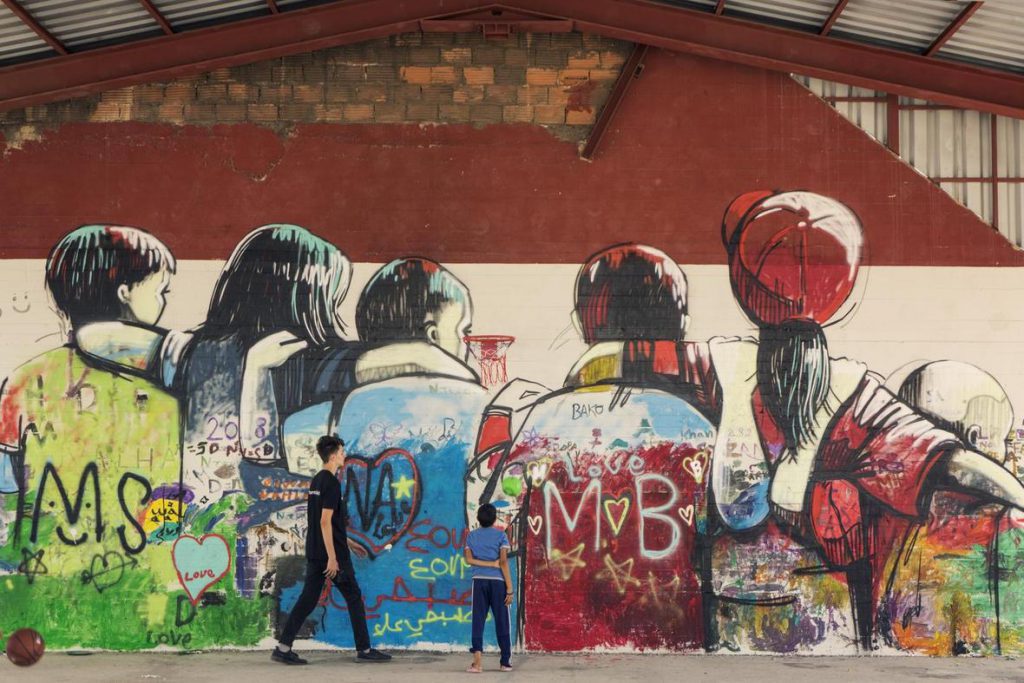
Artists Achilleas Souras and Alice Pasquini join forces with UNICEF to raise awareness on the situation of refugee and migrant children in Greece.
“I love to paint with my hands!” says 5-year-old, Nazli showing her hands covered in yellow paint, with a big smile on her face.
More than 180 children, aged 3 to 17, joined artists Achilleas Souras and Alice Pasquini to create a mural at the Skaramagkas Open Accommodation Site in Athens, Greece. UNICEF and Elix, a local NGO partner, organized the day-long event, aiming to provide children with the opportunity to express themselves through art.
The mural symbolizes unity, peace and friendship, showing seven girls and boys facing the direction of the wall. This depiction is meant to represent the individual voices and identities of children living in the camp – located a few kilometers outside Athens – and inspire children to paint their own messages and images on the backs of the t-shirts as worn by the children in the mural.
“We wanted to do something about identity,” said Pasquini. “Something about each one, but also everyone. What came out is the image of seven kids going over the wall, crossing the wall, and overcoming difficulties together. This is something they can learn here as well, to grow together, to support each other.”
There are 23,500 refugee and migrant children currently in Greece, 29 percent of them live in open accommodation sites around the country. Skaramagkas, a refugee camp located next to a shipyard in the broader area of Piraeus Port, is home to over 2,500 refugees and migrants, more than half of them are children. Most of these children and their families have been living in containers inside the camp for more than a year, increasing their exposure to a range of protection risks and depriving them from the opportunity to integrate into Greek society.
Through education, child protection and social integration interventions in urban areas as well as in open accommodation sites, UNICEF is working to provide refugee and migrant children in Greece with a safe environment, a sense of normalcy and access to basic services, while promoting social integration and inclusion.
Artist Achilleas Souras said that the message of unity emerged as the strongest among the various themes initially explored.
“We thought that this was a more positive theme and one that can be more than just something beautiful to look at,” he said. The wall is near a basketball hoop, so the artists also provided basketballs so that the space could be where children can both have fun and view the mural.
In early 2016, the then 15-year-old student Souras created a series of igloo-shaped art installations made up of more than 1,000 abandoned life vests found along the shores of the Greek islands of Lesvos, Chios and Samos. The “S.O.S. – Save Our Souls” installation has been exhibited worldwide, raising awareness on the dangerous journey made by thousands of refugees and migrants across the Mediterranean Sea every year. The young artist reached out to UNICEF earlier this year, expressing his interest to collaborate on a project that would help shine a brighter light on the everyday lives of the 23,500 refugee and migrant children living in Greece.
Pasquini is a multimedia artist based in Rome who uses painting, illustration, installations and animation to create hopeful art that shares a message of empowerment.
The outlining and painting of the fifteen-meter-long and three-meter-tall mural lasted five hours during which children had the opportunity to play with the two artists, ask questions and learn about ways you can use art to express their thoughts, hopes and dreams.
“I wrote my name and I drew a heart,” said Mohammed, 15 from Pakistan. “Only love can save the world.”
The Elix Learning Centre in Skaramagkas Open Accommodation Site is supported by UNICEF with funding from the European Commission (DG-ECHO), and provides opportunities for children aged three to 17 to learn, to help them make a smooth transition into Greece’s formal education system.
UNICEF is currently managing sixteen non-formal education centres around Greece in collaboration with local implementing partners. Through these centres UNICEF is supporting refugee and migrant children with homework help and remedial classes while also providing basic language and life-skills classes. Since mid-2016, more than 9,500 refugee and migrant have benefited from UNICEF’s non-formal education interventions in the country.
UNICEF is also supporting efforts by the Ministry of Education to provide access to formal education for roughly 12,000 school-age refugee and migrant children. In this direction, UNICEF is providing interpretation services in schools, training teachers on intercultural education, teaching Greek as a second language, and assisting in data collection and analysis to improve national level planning.
Text by Olga Slokou – Slova (full article here)
You may consider a modest donation — however much you can afford, when it comes from the heart, it’s the kind of gesture that makes us warm with appreciation.
leave your comment